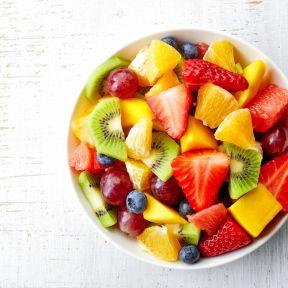HEALTH- Not in a Good Mood? Maybe It’s Your Microbes. The mind-gut connection is well-documented. Reviewed by Lybi Ma

KEY POINTS-
- Nearly 60 percent of the average American diet is made up of ultra-processed food.
- Children eat closer to 70 percent ultra-processed food.
- If you can’t picture a food ingredient as it might appear in nature, put that grocery package down.
“I’m so tired all the time.”
“I feel sad and anxious a lot.”
“I just can’t focus.”
These are observations I’ve heard patients making more and more over the years and we can come up with plenty of reasons for them. Social media and being increasingly isolated are probable contributors. The stress of having multiple responsibilities and struggling financially are undoubtedly drivers of exhaustion and anxiety. But, in the past few months, studies are being published at a furious pace, suggesting that a daily factor that we have more control over may be a much bigger contributor to our moods than was previously thought: Our food.
How can food cause fatigue, depression, anxiety, and loss of focus?
There has long been a mind-gut connection that is well documented. The vagus nerve travels down from the brain and innervates the stomach and intestines. The stomach and intestines produce a variety of substances, like serotonin, that are known to affect our moods. Many different types of health care professionals have recommended mental health treatments such as meditation, talk therapy, and even anti-depressants to improve gut health. It seems, however, that the mind-gut connection may be better understood as a gut-mind connection first.
Recent research is uncovering that the gut-mind connection probably starts with our gut microbiome—the mostly bacterial and fungal species that live primarily in our intestines. When I was in medical school more than 20 years ago, I learned that the bacteria in our stool were there to “bulk it up” and nothing more. Turns out, they do more—a lot more—and what we feed ourselves and our intestinal inhabitants affects our health more than we had previously considered. Researchers have been tying our microbiome’s makeup to bowel illnesses and metabolic conditions for the past ten years. But, in just the last few years, they have begun to ask if the bacteria in our bowels could be responsible for even more.
In one study, scientists performed a gut microbe transfer from depressed humans into normally behaving lab rats, causing the rats to start to act more sluggish. A more recent study of several thousand humans, correlated an abundance of certain species of gut bacteria with depression, suggesting that the types of short-chain fatty acids produced by those bacteria, may be contributing to the humans’ symptoms. It turns out that when gut bacteria digest the components of our food that we can’t, they produce signaling molecules that our bodies, and quite possibly our brains, respond to. It’s not quite The Last of Us, but our microbes could be affecting how we feel.
What exactly are we feeding our gut microbiome?
The most recent studies point to nearly 60 percent of the average American diet being made up of ultra-processed food with our children eating closer to 70 percent ultra-processed food. It is important to recognize that ultra-processed food isn’t just chips and fast food, but over the past few decades, it has become the majority of food items in our pantries and even in our refrigerators. A hallmark of ultra-processed food is the additives that keep them stable on supermarket shelves, acting as emulsifiers, thickeners, and food-softening agents. When most of these additives were approved, it was noted that our bodies didn’t have the ability to digest them, so no one paid them much attention. We weren’t thinking about what our gut microbes might be doing with them. More recent studies have shown that not-so-friendly inhabitants of our gut microbiomes thrive when they consume many of these additives used to make ultra-processed food. We are dramatically altering our gut microbiome by what we are feeding it, perhaps shifting it to a more disease-causing landscape.
The good news is that other studies are emerging demonstrating that we can change our bacteria for the better by changing what we feed them. When we consume whole foods with their fibers intact (not what is extracted and put into ultra-processed food—we know that act differently in our guts), we cause an increase in what we think of as our good gut bacteria. When we eat fermented foods like real sauerkraut, yogurt without additives, kimchi, or a host of other traditional foods, we cause a diversification of our microbiomes, with a shift towards a less inflammatory one.
If we can trace a path from ultra-processed food, whose additives encourage the growth of certain types of disease-causing bacteria, to frank mental health troubles, we can also try to change course by what we feed ourselves and our gut inhabitants. Check the ingredient labels of what you eat and if there are ingredients that you can’t picture as they might appear in nature, put that package down. Instead, choose food items that look closer to how they do in nature and try to do a bit more food preparation at home if this is possible for you. The data is clear—the less ultra-processed food we eat, the healthier we become, both physically and mentally.
- Questions and Answers
- Opinion
- Motivational and Inspiring Story
- Technology
- Live and Let live
- Focus
- Geopolitics
- Military-Arms/Equipment
- Sicurezza
- Economy
- Beasts of Nations
- Machine Tools-The “Mother Industry”
- Art
- Causes
- Crafts
- Dance
- Drinks
- Film/Movie
- Fitness
- Food
- Giochi
- Gardening
- Health
- Home
- Literature
- Music
- Networking
- Altre informazioni
- Party
- Religion
- Shopping
- Sports
- Theater
- Health and Wellness
- News
- Culture

